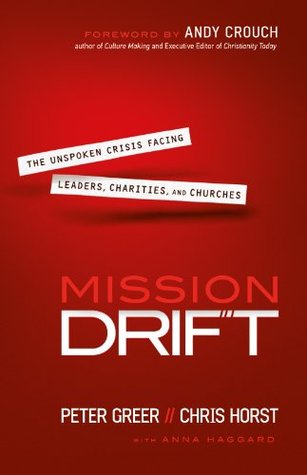More on this book
Kindle Notes & Highlights
by
Peter Greer
Read between
November 10 - November 14, 2019
Carnegie’s funding advanced secularism at an alarming pace throughout the country.
Financial author Ron Blue said to a group of philanthropists at Generous Giving, “Do your giving while you are living so you know where it is going.”
Are explicit in their expectations: By creating clear guidelines and a plan for your giving, you “memorialize” your values and intent. Henry Crowell (founder of The Crowell Trust, profiled in chapter five) modeled this clarity through his indenture. Plan ahead: It’s morbid to consider, but thinking about your estate planning and bequests now will create an opportunity for you to have important conversations with your family. Keep “mission strings” attached: Organizations like the National Christian Foundation can help to build safeguards around your giving. Their mission is to give billions of
...more
What’s not measured slowly becomes irrelevant.
It is possible to be successful in the things that ultimately don’t matter to your organization’s success.
According to the data, the entire population of Haiti would be saved every three years! Clearly, something was wrong in how organizations were measuring and monitoring their impact.
nothing we had ever measured could be verified as undeniable “proof” of the impact of our services.
“Our goal should be to improve our services, not just prove the impact.”6
imperfect measurement is far better than no measurement at all.
organizations should measure ways to best advance the mission, as well as identify issues that could threaten it.
Christ-centered, quality, and then growth.
Our highest goal is to remain faithful to our Christ-centered identity and mission.
Because of our identity, we must purs...
This highlight has been truncated due to consecutive passage length restrictions.
Make an effort to measure more than just the “easy” stuff: For their donors, staff, and board, demonstrating holistic success really matters. Identify ways measurement can lead them off mission: They recognize how poor prioritization or shallow data might lead them to wrong conclusions and result in drift. Believe measuring something is better than nothing: When it comes to matters of the heart, Mission True organizations recognize they must track something to keep their hearts and minds focused on the entirety of their mission. Admit it’s a team effort: They do not use metrics to toot their
...more
Mission True organizations are fixated on stewardship.
“The Christian shoemaker does his Christian duty not by putting little crosses on the shoes,” wrote Martin Luther, “but by making good shoes, because God is interested in good craftsmanship.”
Appealing to an undefined, ethereal set of universal values is not possible when there is no bedrock or standard of truth.
Maintain the highest levels of quality: “Poor quality” and “Christian” should never be used to describe the same organization. Substandard work runs contrary to God’s calling. Unlike Dorian’s organization, they “work at it with all [their] heart, as working for the Lord, not for human masters.”14 Celebrate their unique societal contributions because of their Christian identity: They embrace their Christian distinctiveness and laud the ways this gives them unique opportunities in the places where they work. Integrate the Gospel into all areas of their programs: There is no corner of the
...more
Small things matter: Minor practices go a long way in setting the organization’s tone. For example, whether you step foot inside a Chick-Fil-A in Denver or Dallas or Des Moines, the staff will respond to customers with the now famous “My pleasure.” This simple act is just one of the many ways that Chick-Fil-A builds a culture of hospitality. Consistency counts: Organizations like IJM recognize that fireworks and glossy brochures don’t make a culture; rather, it is a daily commitment to repeatable practices. It’s in the routine. No matter how busy, all employees recognize that 11 a.m. is
...more
Especially in today’s hyper-connected world, it just isn’t a winning strategy to have two differing messages.
Proclaim their full mission to create accountability: By publicly declaring their mission, they invite others to provide feedback. It empowers people to call them out when they are drifting. Deploy language anchors: Weaving Scripture or their core mission tenets into their everyday language provides signposts to ground them toward making decisions based on their mission’s objectives. Build credibility through consistency: Customers and donors easily discredit organizations if they see inconsistency in messaging. By being open and straightforward, they position themselves as an organization,
...more
While I believe in integrity, it is also true that Jesus Christ did NOT reveal himself completely to all audiences. What do you do with that?
Mission True organizations recognize that the local church is the anchor to a thriving mission
“The path to secularization is made straight if you lose sight of the local church.”
the church has a far greater scope and scale than virtually any other social entity in the region.
Invest relationally: Relationships are essential, but they take time. Investing in the local church leadership and building true friendships creates a foundation for collaboration. Over-communicate: It’s insufficient to have preliminary conversations and a memorandum of understanding. Regularly communicate progress and key metrics, and listen to the church’s feedback. One pastor in a rural part of Rwanda told me about my lackluster communication and stated, “We want to support you, but we need to know what you’re doing!” Are generous: They use their platforms and ministries to invite
...more


